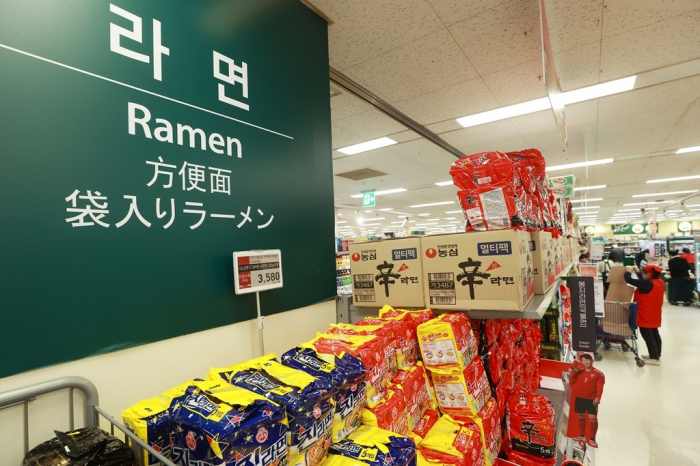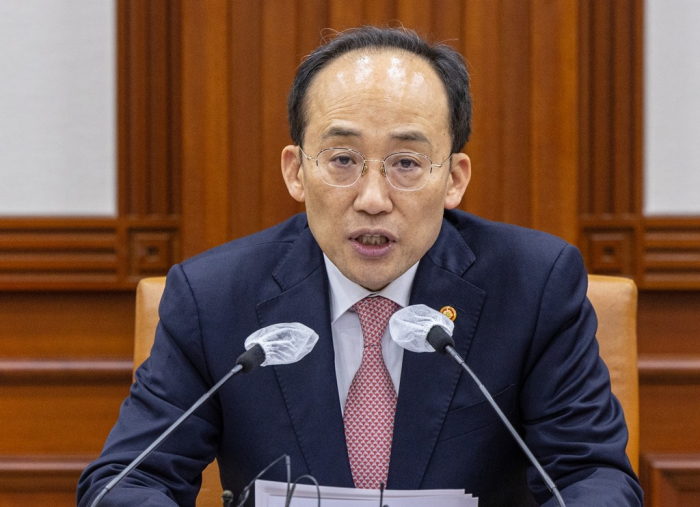Food & Beverage
S.Korea urges ramen makers to cut prices to ease inflation
Nongshim, Samyang shares tumble nearly 10% to lowest in five weeks, seven months, respectively; Ottogi hits three-month trough
By Jun 19, 2023 (Gmt+09:00)
3
Min read
Most Read
LG Chem to sell water filter business to Glenwood PE for $692 million


Kyobo Life poised to buy Japan’s SBI Group-owned savings bank


KT&G eyes overseas M&A after rejecting activist fund's offer


StockX in merger talks with Naver’s online reseller Kream


Mirae Asset to be named Korea Post’s core real estate fund operator



South Korean instant noodle makers are considering price cuts for the first time in 13 years pressured by the government, which aims to further ease inflation at the expense of their profitability.
The country’s No. 1 ramen maker Nongshim Co. and its smaller rivals including Samyang Foods Co. are mulling price reductions, sending their shares sharply lower after Finance Minister Choo Kyung-ho on Sunday urged such moves given falling global wheat prices.
“Global wheat prices tumbled about 50% from last year when ramen prices jumped a lot,” Choo said in a state-run TV program. “We hope companies take appropriate steps including price cuts considering the situation.”
CME Group Inc.’s wheat futures prices have averaged $231 per ton so far this month, down 44.9% from May 2022.
Local instant noodle makers such as Nongshim and Ottogi Corp. raised ramen prices by 9.7-11.3% in the September-November period of last year as wheat import costs hit a record high of $496 per ton due to the Russia-Ukraine war, according to the Ministry of Agriculture, Food and Rural Affairs.
“Suppliers and consumers usually decide prices of items such as ramen in the market, so it is not appropriate for the government to control them,” Choo said. “But it will be great if consumer groups put pressure (on ramen makers) through active checks and price investigations.”

After the comments, share prices of ramen makers lost ground on early Monday in the South Korean stock market. Nongshim tumbled as much as 9.9% to a five-week low of 394,500 won ($307.4), while Samyang and Ottogi hit seven-month and three-month troughs, respectively.
Ramen prices surged 13.1%, the largest since the 2008-09 global financial crisis, in May when headline inflation in Asia’s fourth-largest economy fell for a fourth straight month to a 19-month low.
Local consumers have been demanding ramen makers to reduce prices as the costs of wheat, which along with palm oil account for about 60% of total production expenses, fell.
TO CUT PRICES FIRST TIME SINCE 2010
Ramen makers, which had resisted the consumer requests citing cost pressures, changed their stance after Choo’s remarks.
“We plan to consider various ways to approach prices despite many difficult conditions,” said Nongshim, the maker of the world-famous Shin Ramyun brand.
Samyang, the manufacturer of the globally popular Hot Chicken Flavor Ramen, also said the company was mulling measures to reduce the burden on the nation's consumers.
They are likely to cut ramen prices, eventually, industry sources said. The industry last slashed prices in 2010 after former President Lee Myung-bak expressed concerns over them. Nongshim cut prices of key products such as Shin Ramyun by 2.7-7.1%, leading to overall food sector price reductions.
TO HURT PROFITABILITY
The expected cuts are predicted to hurt the industry’s profitability, which has been improving thanks to the growing popularity of South Korean instant noodles.
Nongshim reported an operating profit margin of 7% in the first quarter, up from around 3% in 2021 and 2022. That compared with Nissin Food Products Co., Japan’s top instant noodle maker, which has been enjoying an 8-10% margin every year.
Global wheat prices rebounded as the war in Ukraine reintensified, which is likely to put further pressure on ramen makers’ earnings, industry sources in Seoul said.
“The operating profit margin, which had halved over the last two years, has managed to normalize this year on strong overseas sales,” said one of the sources.
“Profitability will deteriorate again if we cut prices only because of global wheat prices as overall cost pressures remain firm.”
Write to Hun-Hyoung Ha and Soo-Jung Ha at hhh@hankyung.com
Jongwoo Cheon edited this article.
More to Read
-
 Business & PoliticsTrump Jr. meets Korean business chiefs in back-to-back sessions
Business & PoliticsTrump Jr. meets Korean business chiefs in back-to-back sessionsApr 30, 2025 (Gmt+09:00)
-
 Korean chipmakersSamsung in talks to supply customized HBM4 to Nvidia, Broadcom, Google
Korean chipmakersSamsung in talks to supply customized HBM4 to Nvidia, Broadcom, GoogleApr 30, 2025 (Gmt+09:00)
-
 EnergyLS Cable breaks ground on $681 mn underwater cable plant in Chesapeake
EnergyLS Cable breaks ground on $681 mn underwater cable plant in ChesapeakeApr 29, 2025 (Gmt+09:00)
-
 Business & PoliticsUS tariffs add risk premium to dollar assets: Maurice Obstfeld
Business & PoliticsUS tariffs add risk premium to dollar assets: Maurice ObstfeldApr 29, 2025 (Gmt+09:00)
-

Comment 0
LOG IN


